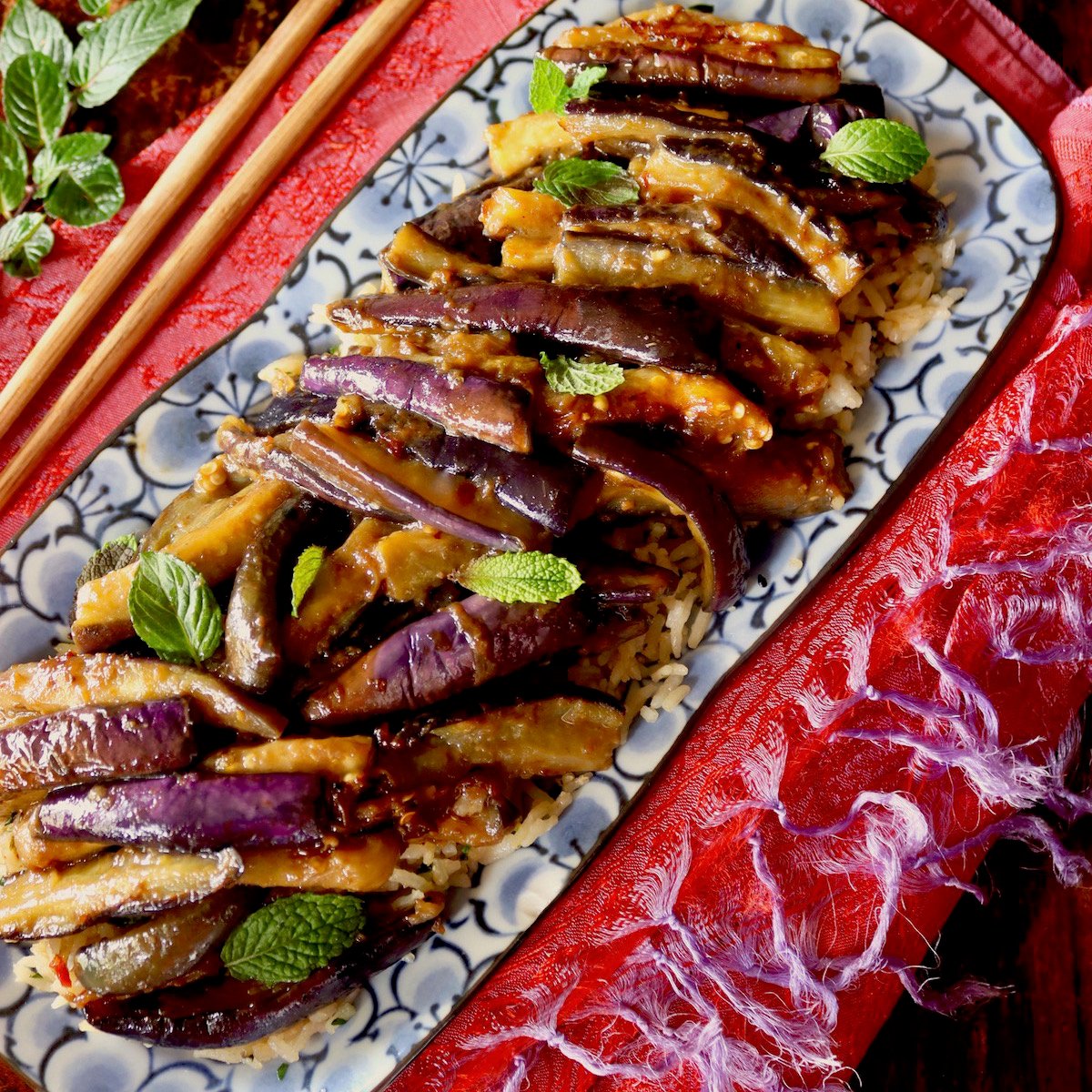
Miso Eggplant is loaded with umami, sweet and savory flavors. Perfect over rice, it’s a fantastic side dish, and it’s hearty enough for a vegan main course, too. This is the most delicious way to eat eggplant!
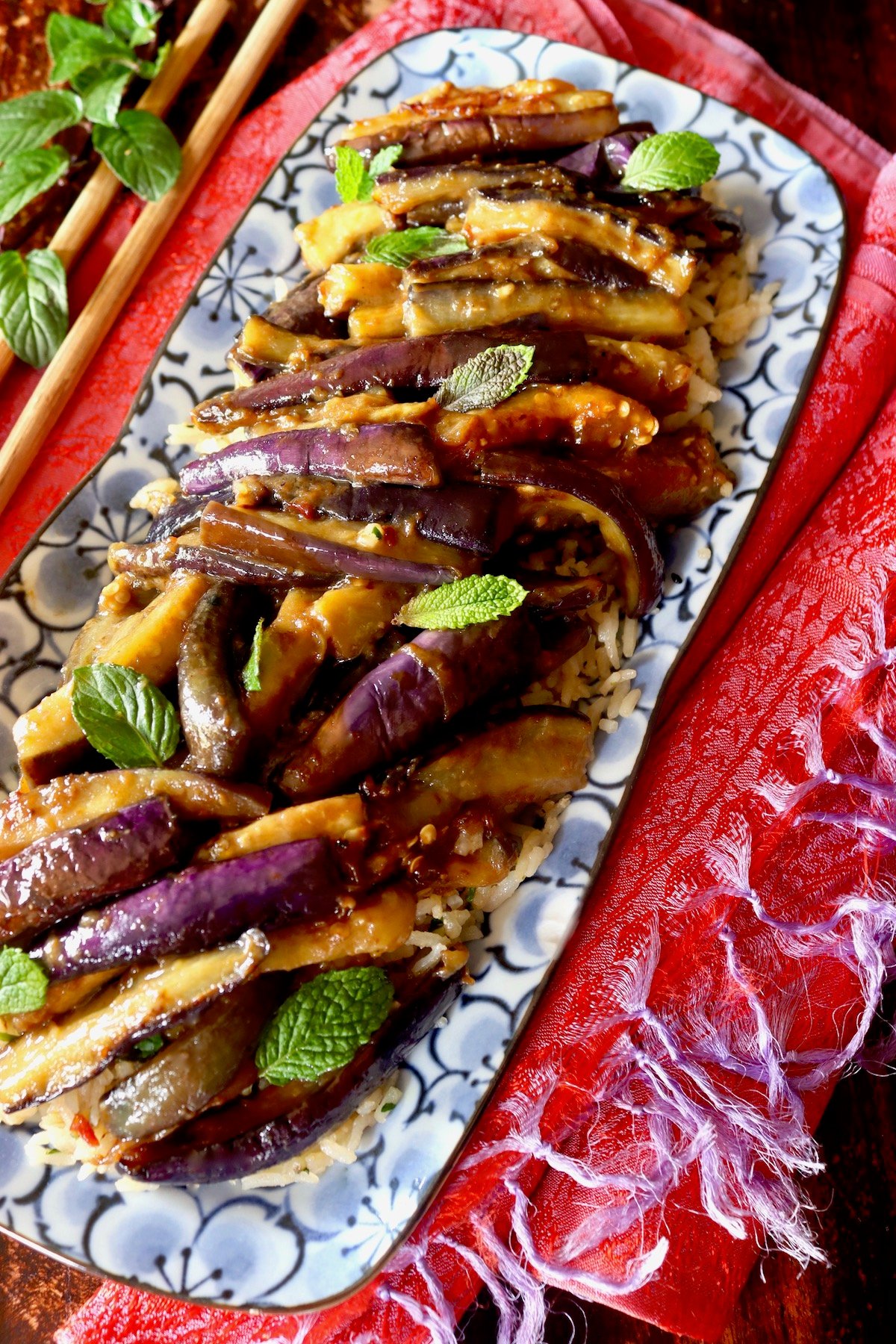
If you’re not so sure about eggplant, this Miso Eggplant recipe is a must.
There’s no better way to eat eggplant as far as I’m concerned. You might like it other ways, but I think you’ll love it this way.
Sweet and spicy Asian flavors that glaze the eggplant, seep deep into every bite, which is soft on the inside with a very subtle “crust” on the outside created from caramelized ingredients.
Miso Glazed Japanese Eggplant is called Nasu Dengaku in Japanese.
Key Ingredients
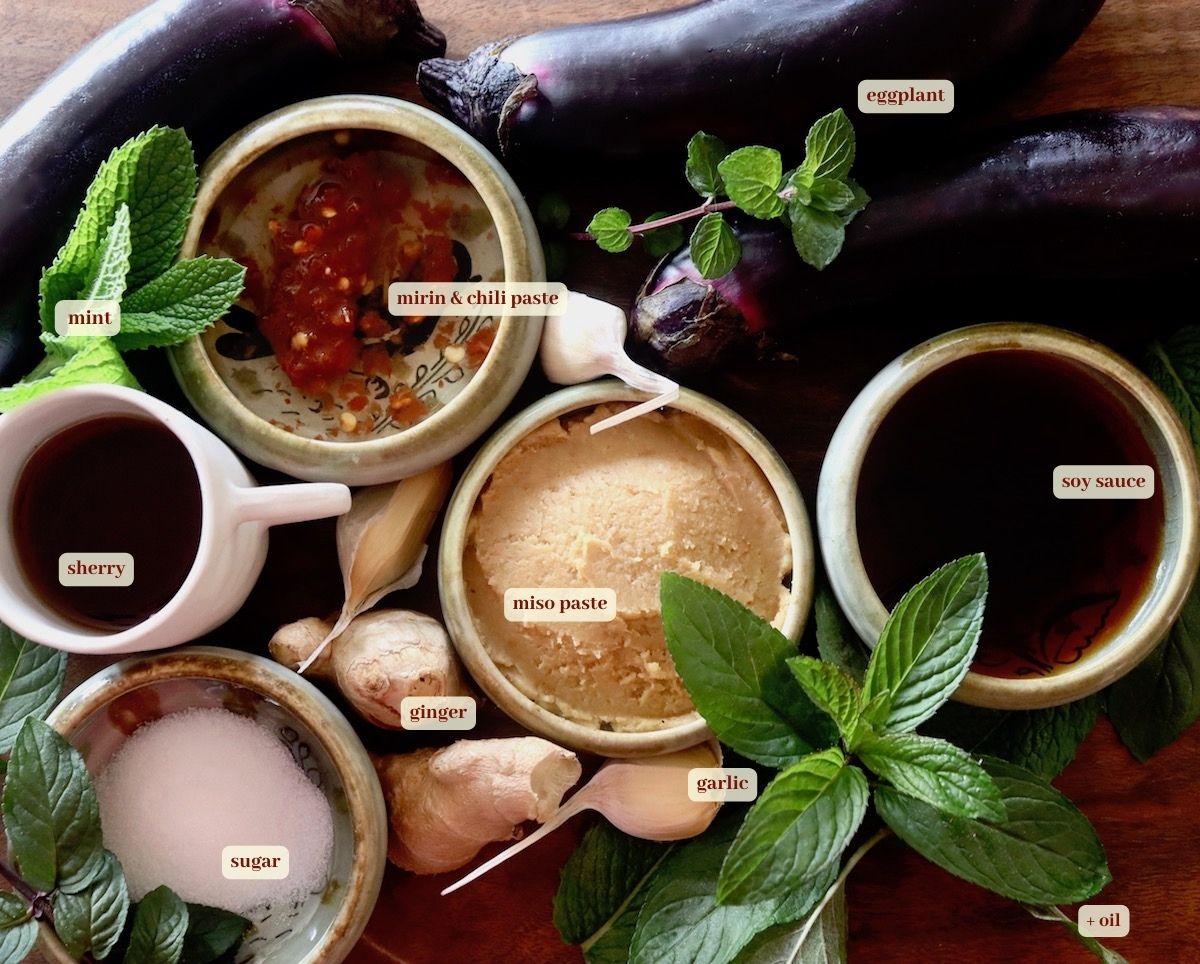

- eggplant – The best varieties to use for Miso Eggplant are Japanese and Chinese. Both are long and skinny, with the latter being lighter in color. They have fewer seeds, are slightly less bitter, and have a thinner skin.
- white or light miso paste – Miso is a traditional Japanese ingredient made from fermented soybeans. There are three main types of miso paste: white miso, or Shiro miso, red miso or Aka miso, and yellow miso or Shinshu miso. White miso paste is the most mild and works well with the other ingredients in this recipe. You can find it in most grocery stores and definitely in Asian markets.
- chili paste – I use Sambal Oelek. The chili past can be substituted with finely minced hot peppers, like Thai or Serrano. Sriracha sauce can also be used as a substitute.
- mirin – Mirin is a sweet rice wine and you should be able to find it in any Asian market and in most larger grocery stores.
- low sodium soy sauce or Tamari – Tamari is slightly thicker and richer than regular soy sauce, and it’s usually gluten-free. You can use either one.
- fresh garlic – Look for firm heads of garlic without any soft spots or green shoots. Raw garlic cloves should be firm without any dark spots. Minced shallots can substitute the garlic, but since it’s less pungent and less sharp, use a bit more of the chili paste. You can also substitute it with about the half the amount of granulated garlic or garlic powder.
- fresh ginger – Fresh ginger roots should be firm and feel heavy for their size. The best way to grate it for the miso sauce is with a microplane zester. Though fresh is the best for this recipe, you can use about half of the amount of ground ginger if necessary.
- avocado oil – Or other neutral oil like vegetable.
- dry sherry – This is used to deglaze the pan after everything is caramelized and the eggplant is cooked. It also adds a wonderful nut-like sweet flavor.
- fresh mint. This brightens the entire plate! Fresh basil can be used instead of the mint, or use a combination. Toasted sesame seeds are also a great additional garnish.
(See recipe card below for quantities.)
* Pro Tip * Green shoots in garlic can be very bitter. If your garlic has them, don’t worry, just cut the cloves in half and remove them with the tip of a paring knife. The rest of the clove should still be good.
How to Make it
– In a bowl large enough to hold all of the eggplant, whisk the miso paste with the mirin, soy sauce, chili paste, garlic, ginger and sugar.
Recipe Tip: If you’re not sure how much heat you want, don’t add the chili paste to the marinade — wait until you’ve finished cooking the eggplant, and season to taste with it then.
– Cut the eggplant into approx. 3 x ½-inch sticks, and add them to the miso mixture as you go.




– Mix gently to ensure all of it has been evenly coated. Cover the bowl with plastic wrap and let it marinate for about 30 minutes at room temperature.
Recipe Tip: 15 to 30 minutes is all you need for the marinating. Don’t exceed 45 minutes.
– Coat the bottom of a large skillet (about 14-inch) with the oil and place it over medium-high heat. Once it’s very hot, add the eggplant, including any excess marinade. Mixing occasionally, sauté until the eggplant is golden and soft, about 8 minutes. Turn the heat to medium-low about halfway through.
Recipe Tip: Be sure your pan is hot enough when you add the marinated eggplant. You should hear a sizzling sound when it hits the pan — if you don’t, wait for it to get hotter.
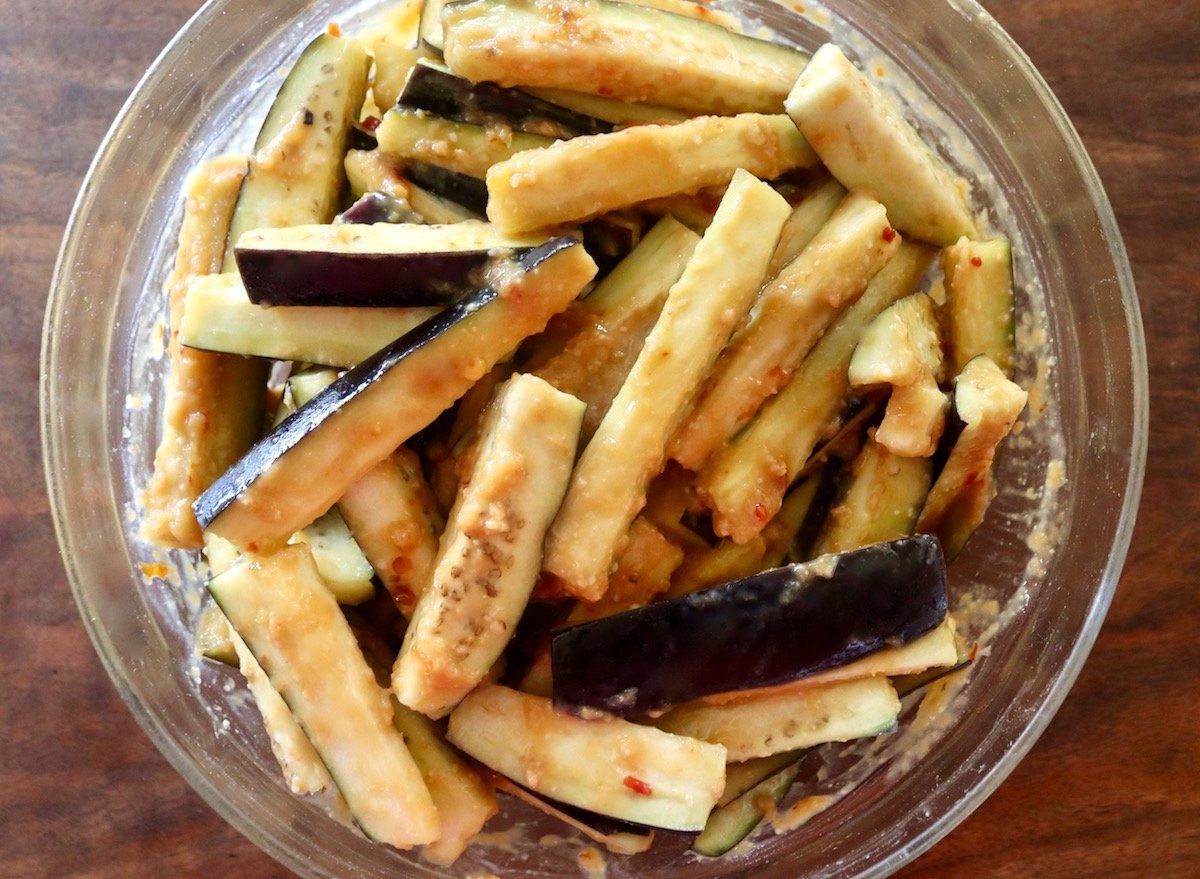

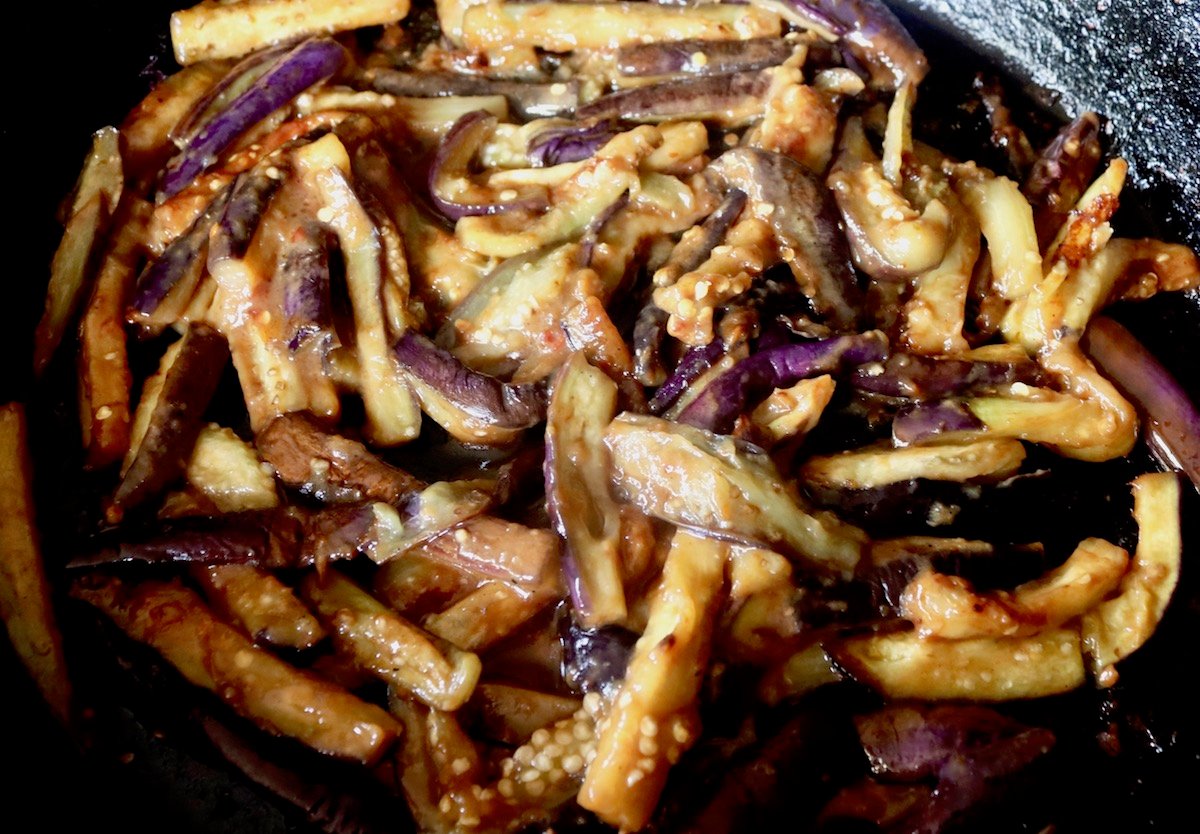

– Pour in the sherry to deglaze the pan. Then turn the heat up again, and use a flat-edged metal spatula to scrape all of the stuck bits of the marinade from the bottom of the pan into the eggplant. Cook just until most of the liquid is absorbed, about 30 seconds or so.
– Add a few mint small leaves to the eggplant and serve over rice (if desired).
Variations
- Other veggies. This recipe also works with zucchini or yellow squash.
- Add a protein. If you want to add a protein like tofu, meat, chicken or fish, do so after it’s cooked, and after the eggplant is ready. Thinly sliced steak, sliced chicken, cubed tofu or broiled fish would be great. The tofu is best if it’s browned fist, but it can also be added raw.
- Gluten free? If you’re gluten-free, or cooking for someone who is, be sure to use either Tamari or a gluten-free soy sauce, and gluten-free miso paste (not all of them are).
* Pro Tip * Miso paste is a very unique ingredient that’s easy to find, and since this is Miso Eggplant, I would not try to substitute the miso with anything. That said, you can make a dish reminiscent of this using an additional 1 to 2 tablespoons of soy sauce instead.
Serving Suggestions
Can you make it ahead?
While you can make this a day or so ahead and reheat it, it’s at its best right out of the pan. You’ll miss the slightly crispy edges if it’s eaten a day later. That said, it will still be outrageously delicious!
Other Eggplant Favorites


More Recipes with Miso
Why are Eggplants called Eggplants?
Just in case you’re curious . . . .
Small, Thai eggplants are a whitish, yellowish color and have the shape of a goose egg. And because of these particular fruits, in the 18th century, the name eggplant was born.
Yes, though eaten as a vegetable, technically eggplants are a fruit — a berry actually!
Whether it’s dark purple or burgundy, small and cute, long and thin, or big and round, it’s still an eggplant.
I hope you love this dish as much as my family and I do.


Miso Eggplant Recipe
Instructions
-
Prep the sauce/marinade. In a large mixing bowl (that will eventually hold all of the eggplant), whisk the miso paste with the mirin, soy sauce, chili paste, garlic, ginger and sugar. Set aside.
-
Prep and marinate eggplant. Cut the eggplant into sticks that are approximately 3-inches long and ½-inch wide. Add them to the miso mixture as you go. Mix gently to ensure all of it has been evenly coated. Cover the bowl with plastic wrap and let it marinate for about 30 minutes at room temperature.
-
Cook. Coat the bottom of a large skillet (about 14-inch) with the oil and place it over medium-high heat. Once it’s very hot, add the eggplant, including any excess marinade. It should sizzle immediately — if it doesn’t, wait until the pan is hot enough! Mixing occasionally, sauté until the eggplant is golden and soft, about 8 minutes. Turn the heat to medium-low about halfway through. Pour in the sherry to deglaze the pan. Then turn the heat up again, and use a flat-edged metal spatula to scrape all of the stuck bits of the marinade from the bottom of the pan into the eggplant. Cook just until most of the liquid is absorbed, about 30 seconds or so.
-
Serve. Add a few mint small leaves to the eggplant and serve over rice (if desired).
NOTES
* If you’re gluten-free, or cooking for someone who is, be sure to use either Tamari or a gluten-free soy sauce, and gluten-free miso paste (not all of them are).
NUTRITION
Calories: 189kcal | Carbohydrates: 23g | Protein: 4g | Fat: 8g | Saturated Fat: 1g | Polyunsaturated Fat: 6g | Monounsaturated Fat: 1g | Sodium: 888mg | Potassium: 468mg | Fiber: 6g | Sugar: 13g | Vitamin A: 59IU | Vitamin C: 4mg | Calcium: 31mg | Iron: 1mg
Cooking On The Weekends is a participant in the Amazon Services LLC Associates Program, an affiliate advertising program designed to provide a means for sites to earn advertising fees by advertising and linking to Amazon.com.






